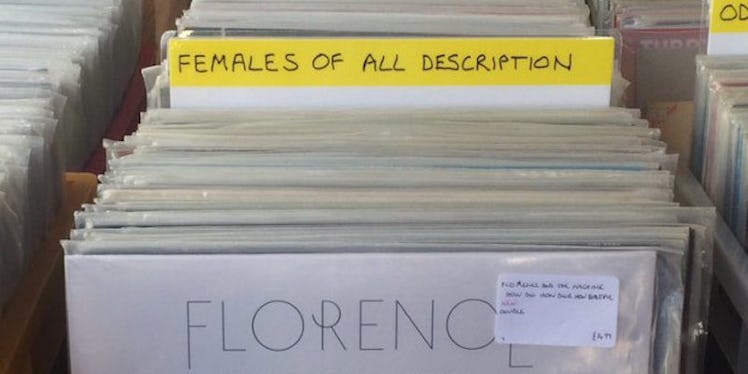
This Woman's Tweets About Sexist Record Store Labels Will Make You So Angry
Singer Kate Nash was checking out a record store when she found something interesting. Among music genres like "Reggae," there was a very specific, sexist genre called "Females Of All Description."
So, while men can be filed into the legitimate genres of music they produce, women are just "women." Women can't be rock musicians, rappers or pop singers like men can.
They're just "women of all description."
Apparently, the men can be filed all over the place, but women are secluded to only one section of the record store.
Essentially, this labeling indicates that men are the default. They're not "male rap" or "male rock." They're just "rap" and "rock."
But women AREN'T the default, so they have to be indicated as a separate entity.
Nash tweeted more about her outrage:
She concluded her tweets with a simple request:
Sexism has permeated the music industry for, well, ever. This has been true across every musical genre. Just this year alone, we saw examples of sexism in the classical, indie rock and pop world.
In December, the Metropolitan Opera will be performing its first opera by a woman since 1903: That's 113 years without a female composer.
And don't even get me started on the irresponsible lack of female conductors on major classical stages. (Shout out to Marin Alsop holding it down in Baltimore.)
In the rock world, Best Coast's Bethany Cosentino has spent a large portion of this year talking about the sexism she's faced in her music career, from comments and criticism directed at her to the patriarchal state of the industry.
She wrote for Lenny Letter,
We live in a world where a man can yell at me while I'm onstage, 'Bethany, I wanna fuck you!' and I am supposed to not only stand there and take it, but also digest it as a compliment to add to my fierce arsenal of sexy confidence. Not only should I take it, I should be smiling and excited to be sexualized by my audience.
If you think this sexism only goes as far as bad record store labeling, sexual comments and lack of opportunity, you're not paying attention.
Amber Coffman of the Dirty Projectors spoke up in January about sexual harassment she received from music publicist Heathcliff Berru. After she came forward, several other women did as well. Berru was forced to resign.
And over in pop, we've got Kesha's high-profile sexual assault case against Sony producer Dr. Luke.
There are countless other examples of sexism in the music industry, and I'm not even getting into lyrical content or the insane dominance men have as rappers.
This is why we women feel compelled to speak up when we see something ridiculous, like the record store labeling that Nash found. The fact that this kind of casual sexism is accepted without recognition indicates the state of the industry, which remains startlingly patriarchal.
Citations: New York Times, Lenny Letter, Billboard